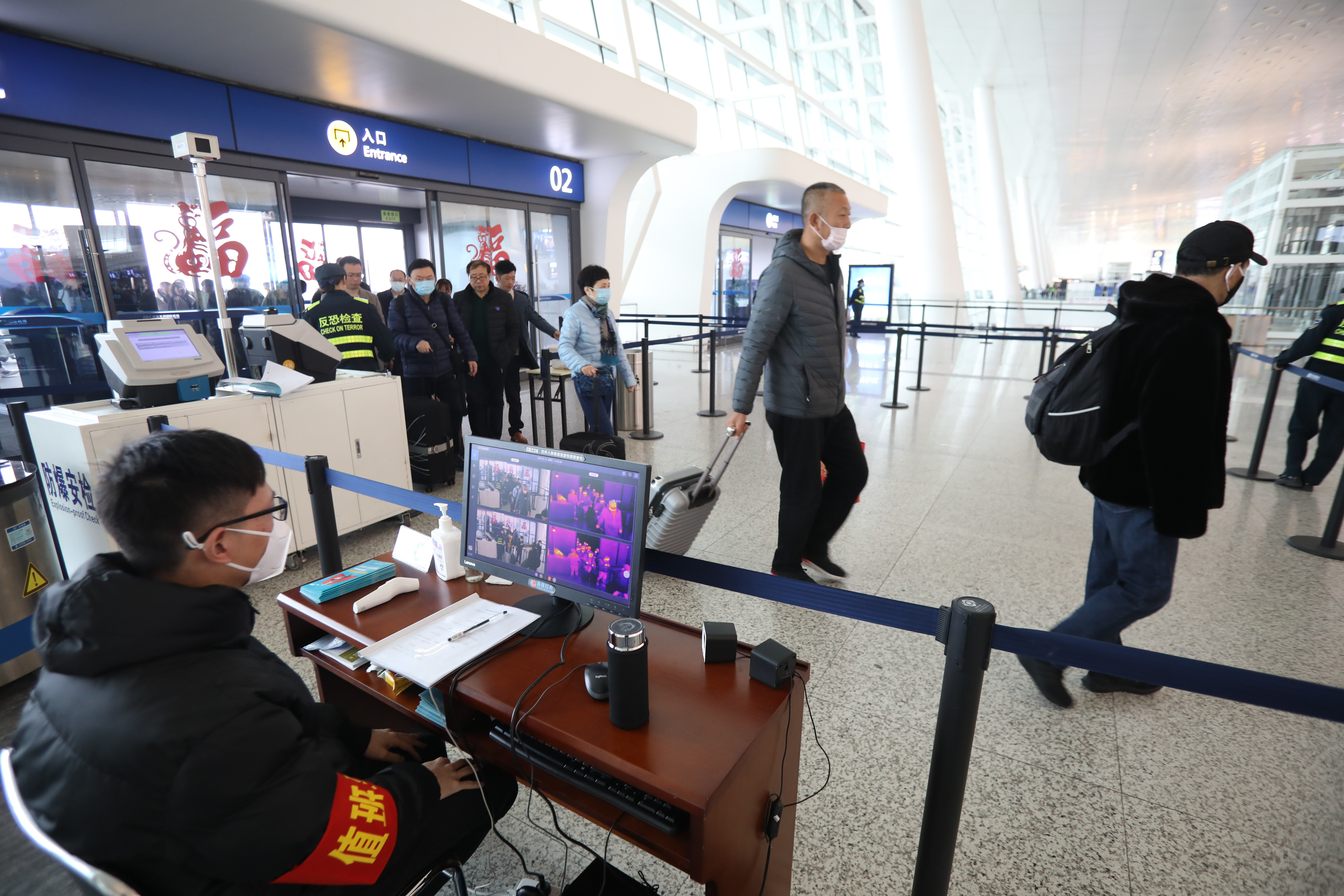
Staff members take passengers' body temperature at Tianhe International Airport in Wuhan, capital of central China's Hubei Province, Jan. 21, 2020. (Xinhua/Xiao Yijiu)
Here's what the experts have to say about the novel coronavirus outbreak.
BEIJING, Jan. 22 (Xinhua) -- Faced with the fast-changing situation of the novel coronavirus outbreak, China is at a crucial stage to prevent and control the spread of the virus, according to Chinese experts.
"The current outbreak is concentrated in the city of Wuhan in central China, and is sporadic in other places, meaning it is still a regional outbreak," said Zhong Nanshan, a renowned respiratory expert and head of a high-level expert team of the National Health Commission (NHC).
"The people-to-people transmission of the novel coronavirus and infections among medical staff have been confirmed," Zhong said.
EARLY STAGE
The continuous emergence of new cases indicates the outbreak is still at its early stage of rapid changes, Zhong added.
Zeng Guang, chief epidemiologist of the Chinese Center for Disease Control and Prevention (China CDC), said no infections among children or students have been reported in Wuhan, and the infection cases are mainly elderly people.
The outbreak is at its early stage of community transmission, Zeng said, adding that it can be reversed if measures are taken now.
China has taken solid measures to resolutely curb the spread of the virus, and has released the whole genome sequencing of the novel coronavirus, which will help scientists and health authorities across the world develop diagnostic kits and study the viral pathogenicity.
The geographical distribution of Wuhan's infection cases indicates a close relationship between the outbreak and a local seafood market. Investigations showed that there were previously illegal sales of wildlife in the market.
Based on the findings in the whole genome sequencing, it can be speculated that wild animals could have played a key role in the emergence of the disease. But it remains unclear what kind of animal has caused the infections, said Gao Fu, an academician of the Chinese Academy of Sciences and head of the China CDC.

File photo of Zhong Nanshan, a renowned respiratory expert and head of a high-level expert team of the National Health Commission. (Xinhua/Xiao Yijiu)
PREVENTING SUPER-SPREADER
No super-spreader, or a highly contagious virus carrier, has emerged, according to the experts.
Zhong predicted an increase in viral pneumonia cases during the ongoing Lunar New Year travel rush, noting that a key task is to prevent super-spreaders from emerging.
According to Zhong, putting the confirmed and suspected patients in quarantine is the most effective method to bring the outbreak under control.
The experts advised anyone who feels unwell to avoid traveling during the holiday season, and seek medical treatment as soon as possible.
EARLY DETECTION
The pneumonia resulting from the infection of the novel coronavirus has been classified as a category B infectious disease and a quarantinable disease at the border, according to an earlier announcement by the NHC.
Preventive and control measures of category A infectious diseases have been taken to fight against the pneumonia caused by the novel coronavirus.
Though the spread of the novel coronavirus has just started, which is at a rising stage, the virus is less contagious than the SARS (Severe Acute Respiratory Syndrome) virus, Zhong said.
The future situation depends on the development of the virus as well as how the outbreak is controlled, Zhong added.
A total of 291 confirmed cases of new coronavirus-related pneumonia and 54 suspected cases have been reported in China by the end of Monday.
On Monday alone, 77 new confirmed cases were reported. Experts cited the use of new testing techniques that lead to faster detection as a key reason for the rise in numbers.
"Suspected cases are confirmed after being tested positive twice, much faster than the previous procedure of going through the China CDC or rigorous examination by health authorities," Zhong said.
Early detection and timely quarantine will effectively contain the infection sources and help prevent large-scale outbreaks, said Li Lanjuan, an academician with the Chinese Academy of Engineering, who heads the State Key Laboratory for Diagnosis and Treatment of Infectious Diseases.
Li added that a set of prevention and control measures have also been put in place for outpatient services across the country.
"In general, China has a relatively sound clinical treatment system. There is no need for panic," Li said.
STRENGTHENED MEASURES
The NHC Tuesday announced it has led the establishment of a joint prevention and control mechanism, with 32 departments jointly overseeing the work of medical treatment, virus control and scientific research, among others.
A daily report system of new pneumonia cases has been activated. The NHC has started publishing daily data of confirmed cases in all provincial-level regions since Tuesday.
During the upcoming Spring Festival holiday, densely populated places including train stations, airports and shopping malls, as well as buses and trains, should adopt measures of ventilation, sterilization and temperature screening according to local situations, the NHC said.
The commission also banned medical institutions from rejecting confirmed or suspected viral pneumonia patients for any reason, noting that the supply of relevant drugs, diagnostic kits and personal protective equipment is stable. ■



